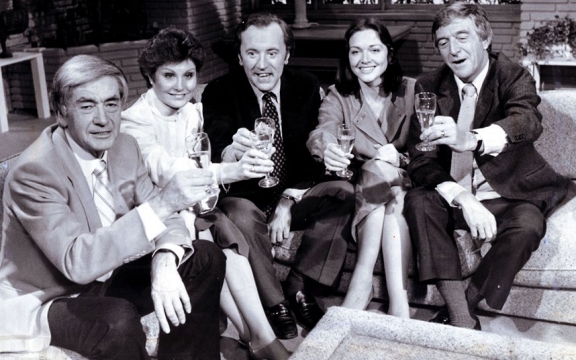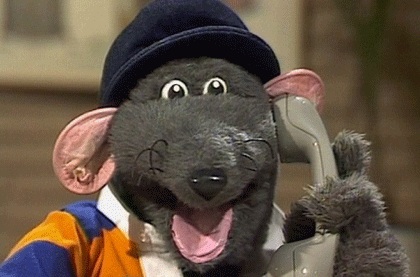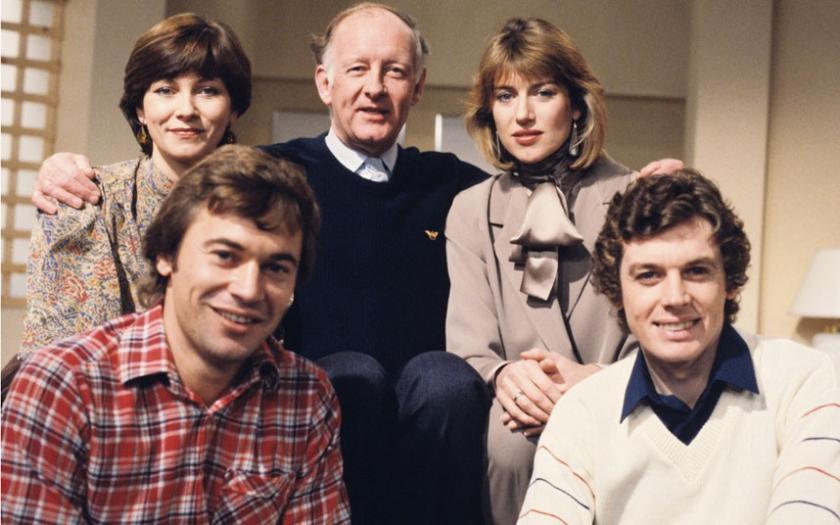As Gyles Brandreth pointed out, before the advent of breakfast television in 1983, Britain was a civilised country in which people ate breakfast while browsing through a newspaper. Then the BBC cheekily nipped in with its new Breakfast Time programme, a fortnight ahead of the much-hyped all-star TV-am project, and the nation has been going to hell in a handbasket ever since.
This often hilarious account of the breakfast TV wars of the 1980s ladled on the military metaphors a little too eagerly, but it was propelled swiftly forwards by a droll voice-over from Peter Snow as it unravelled a lurid catalogue of events that hardly needed embroidering. In an amazing feat of self-denial, the programme-makers omitted any reference to Frank Bough's extraordinary adventures with Mayfair vice girls and cocaine which got him drummed out of the BBC in 1988, but that was probably the quid pro quo for Bough agreeing to be interviewed for the film. At 81, he still looked every inch the unflappable studio host, and his recollections of how he led his squad (including Selina Scott, Nick Ross, Diana Moran the Green Goddess et al) were crisp and informative.
 As was his unambiguous opinion that the BBC screwed up big-time when it decided to alter the amazingly successful Breakfast Time formula (which looked far more like an ITV programme than ITV's own version originally had), and made Bough put on a jacket and tie and sit behind a desk reading out news bulletins instead of mucking about on sofas while modelling an exotic selection of pullovers. This was in response to TV-am's strategy of "out-sofaing" the BBC, as it recovered from its disastrous beginnings by flinging such gimmicks as Roland Rat, horoscopes and Chris Tarrant into its ever-tackier brew. To everyone's surprise, the BBC had lucked into the perfect early-morning format from day one, successfully overcoming the kneejerk prejudice that (as Nick Ross put it) "television in the morning was outrageous - it was just decadence beyond belief."
As was his unambiguous opinion that the BBC screwed up big-time when it decided to alter the amazingly successful Breakfast Time formula (which looked far more like an ITV programme than ITV's own version originally had), and made Bough put on a jacket and tie and sit behind a desk reading out news bulletins instead of mucking about on sofas while modelling an exotic selection of pullovers. This was in response to TV-am's strategy of "out-sofaing" the BBC, as it recovered from its disastrous beginnings by flinging such gimmicks as Roland Rat, horoscopes and Chris Tarrant into its ever-tackier brew. To everyone's surprise, the BBC had lucked into the perfect early-morning format from day one, successfully overcoming the kneejerk prejudice that (as Nick Ross put it) "television in the morning was outrageous - it was just decadence beyond belief."
The account of the original TV-am debacle reeked with a strangely irresistible schadenfreude. The smug self-regard of David Frost as he led his "Famous Five" A-team (pictured above) into the spotlight was cringetastic to behold - "hello, good morning and welcome," he smirked, as if lightly brushed with Mazola cooking oil - although it wasn't much worse than the aura of sneery superiority emanating from Anna Ford and Angela Rippon, who seemed to believe they'd been anointed in perpetuity into some kind of regal broadcasting dynasty. Rippon absurdly told viewers she hoped they'd stay tuned for the next eight years, ie the length of the original franchise.
 TV-am was groaning under the tonnage of so much much massed broadcasting talent that it hadn't bothered to think about programming that might appeal to viewers. It would open with an hour-long news programme called Daybreak. "I turned on at 6am and there was Robert Kee, as though he was presenting Panorama!" spluttered Gyles Brandreth. "At six in the morning!"
TV-am was groaning under the tonnage of so much much massed broadcasting talent that it hadn't bothered to think about programming that might appeal to viewers. It would open with an hour-long news programme called Daybreak. "I turned on at 6am and there was Robert Kee, as though he was presenting Panorama!" spluttered Gyles Brandreth. "At six in the morning!"
It couldn't, and didn't, last. Founding chairman Peter Jay was ousted by board members Jonathan and Tim Aitken ("Peter had many fine qualities, but being an executive was not one of them," said Jonathan), then Rippon and Ford were sacked by the abrasive Tim for their display of support for Jay. It took the introduction of geezerish populist Greg Dyke to drag TV-am off its high horse and into profitability, though Dyke himself got the shove courtesy of bruising Aussie executive Bruce Gyngell (TV-am's saviour Roland Rat, above). But Dyke had the last laugh when his new Sunrise company wrested the breakfast franchise from TV-am. "There's a few people in your life you'd like to get your own back on, and Bruce was one of them," beamed Greg.















Add comment